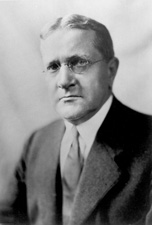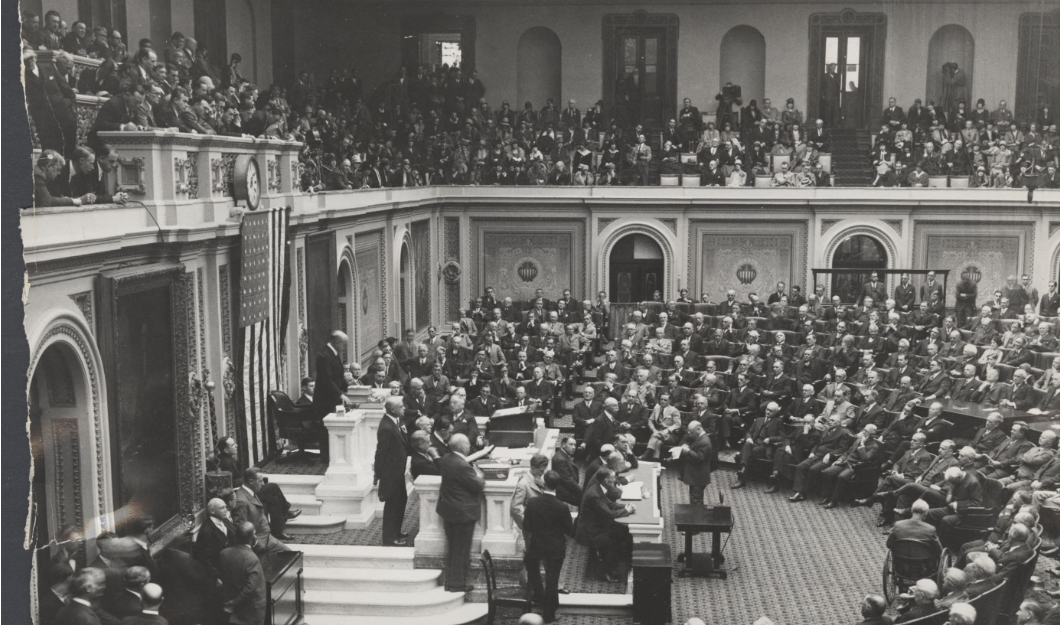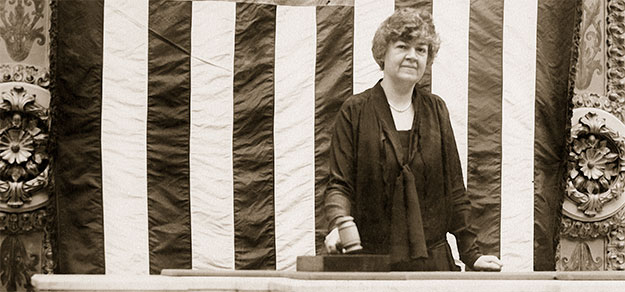|
Fred Dickinson Letts
Fred Dickinson Letts (April 26, 1875 – January 19, 1965) was a United States representative from Iowa, and a United States district judge of the United States District Court for the District of Columbia. Education and career Born on April 26, 1875, in Ainsworth, Washington County, Iowa, Letts attended the common schools of Washington County. He attended Columbia University, then received a Bachelor of Science degree in 1897 from Parsons College in Fairfield, Iowa, and a Bachelor of Laws in 1899 from the University of Iowa College of Law and was admitted to the bar that year. He entered private practice in Davenport, Iowa from 1899 to 1911, returning briefly to private practice from 1912 to 1914. He was a Judge of the Iowa District Court for the Second Judicial District from 1911 to 1912, and from 1914 to 1925. Congressional service Letts was elected as a Republican from Iowa's 2nd congressional district to the United States House of Representatives of the 69th ... [...More Info...] [...Related Items...] OR: [Wikipedia] [Google] [Baidu] |
Senior Status
Senior status is a form of semi-retirement for United States federal judges. To qualify, a judge in the Federal judiciary of the United States, federal court system must be at least 65 years old, and the sum of the judge's age and years of service as a federal judge must be at least 80 years. As long as senior judges carry at least a 25 percent caseload or meet other criteria for activity, they remain entitled to maintain a staffed office and chambers, including a secretary and their normal complement of law clerks, and they continue to receive annual cost-of-living increases. Senior judges vacate their seats on the bench, and the President of the United States, president may appoint new full-time judges to fill those seats. Some U.S. states have similar systems for senior judges. State court (United States), State courts with a similar system include Iowa (for judges on the Iowa Court of Appeals), Pennsylvania, and Virginia (for justices of the Virginia Supreme Court). Statuto ... [...More Info...] [...Related Items...] OR: [Wikipedia] [Google] [Baidu] |
University Of Iowa College Of Law
The University of Iowa College of Law is the law school of the University of Iowa, located in Iowa City, Iowa. It was founded in 1865. Iowa is ranked the 28th-best law school in the United States The United States of America (U.S.A. or USA), commonly known as the United States (U.S. or US) or America, is a country primarily located in North America. It consists of 50 states, a federal district, five major unincorporated territorie ... by the '' U.S. News & World Report'' "Best Law School" rankings. History Iowa's College of Law is said to have graduated the first female law student in the nation, Mary Beth Hickey, in 1873. The second woman to graduate from Iowa Law was Mary Humphrey Haddok in 1875, who later became the first woman admitted to practice before the U.S. District and Circuit Courts. Alexander G. Clark, Jr. was the first African American to graduate from the law school, and his father Alexander G. Clark was the second. The senior Clark was ambassador to L ... [...More Info...] [...Related Items...] OR: [Wikipedia] [Google] [Baidu] |
Recess Appointment
In the United States, a recess appointment is an appointment by the president of a federal official when the U.S. Senate is in recess. Under the U.S. Constitution's Appointments Clause, the President is empowered to nominate, and with the advice and consent (confirmation) of the Senate, make appointments to high-level policy-making positions in federal departments, agencies, boards, and commissions, as well as to the federal judiciary. A recess appointment under Article II, Section 2, Clause 3 of the Constitution is an alternative method of appointing officials that allows the temporary filling of offices during periods when the Senate is not in session. It was anticipated that the Senate would be away for months at a time, so the ability to fill vacancies in important positions when the Senate is in recess and unavailable to provide advice and consent was deemed essential to maintain government function, as described by Alexander Hamilton in No. 67 of ''The Federalist Papers ... [...More Info...] [...Related Items...] OR: [Wikipedia] [Google] [Baidu] |
72nd United States Congress
The 72nd United States Congress was a meeting of the legislative branch of the United States federal government, consisting of the United States Senate and the United States House of Representatives. It met in Washington, D.C. from March 4, 1931, to March 4, 1933, during the last two years of Herbert Hoover's presidency. The apportionment of seats in this House of Representatives was based on the thirteenth decennial census of the United States in 1910. The Senate had a Republican majority. The House started with a very slim Republican majority, but by the time it first met in December 1931, the Democrats had gained a majority through special elections. Major events * Ongoing: Great Depression * January 12, 1932: Hattie Wyatt Caraway of Arkansas became the first woman elected to the United States Senate. (Rebecca Latimer Felton of Georgia had been appointed to fill a vacancy in 1922; the 87-year-old Felton served one day as a senator.) Caraway had won a special election t ... [...More Info...] [...Related Items...] OR: [Wikipedia] [Google] [Baidu] |
71st United States Congress
The 71st United States Congress was a meeting of the legislature of the United States federal government, consisting of the United States Senate and the United States House of Representatives. It met in Washington, D.C. from March 4, 1929, to March 4, 1931, during the first two years of Herbert Hoover's presidency. The apportionment of seats in the House of Representatives was based on the thirteenth decennial census of the United States in 1910. Both the House and Senate remained under Republican control, with increased majorities in each chamber. And with Herbert Hoover being sworn in as President on March 4, 1929, the Republicans maintained an overall federal government trifecta. The 71st Congress also featured the most special elections of any Congress with 27 in all. Major events * March 4, 1929: Herbert C. Hoover became President of the United States * October 24, 1929 – October 29, 1929: Wall Street Crash of 1929: Three multi-digit percentage drops wipe out more t ... [...More Info...] [...Related Items...] OR: [Wikipedia] [Google] [Baidu] |
70th United States Congress
The 70th United States Congress was a meeting of the legislative branch of the United States federal government, consisting of the United States Senate and the United States House of Representatives. It met in Washington, D.C. from March 4, 1927, to March 4, 1929, during the last two years of Calvin Coolidge's presidency. The apportionment of seats in the House of Representatives was based on the thirteenth decennial census of the United States in 1910. Both chambers had a Republican majority - albeit reduced from the previous Congress - and along with President Coolidge, the Republicans maintained an overall federal government trifecta. Major events * November 6, 1928: U.S. Senate elections and U.S. House elections * This was the last Congress to be exclusively white and the last to not have a single black member of Congress in either chamber. Major legislation * March 10, 1928: Settlement of War Claims Act * May 15, 1928: Flood Control Act of 1928 (Jones–Reid Act) ... [...More Info...] [...Related Items...] OR: [Wikipedia] [Google] [Baidu] |
69th United States Congress
The 69th United States Congress was a meeting of the legislative branch of the United States federal government, consisting of the United States Senate and the United States House of Representatives. It met in Washington, D.C. from March 4, 1925, to March 4, 1927, during the third and fourth years of Calvin Coolidge's presidency. The apportionment of seats in the House of Representatives was based on the thirteenth decennial census of the United States in 1910. The Republicans made modest gains in maintaining their majority in both chambers, and with the election of President Calvin Coolidge to his own term in office, the Republicans maintained an overall federal government trifecta. Major events A special session of the Senate was called by President Coolidge on February 14, 1925. * Impeachment of Judge George W. English — On April 1, 1926, the House of Representatives impeached Judge George W. English of the United States District Court for the Eastern District of Ill ... [...More Info...] [...Related Items...] OR: [Wikipedia] [Google] [Baidu] |
United States House Of Representatives
The United States House of Representatives, often referred to as the House of Representatives, the U.S. House, or simply the House, is the Lower house, lower chamber of the United States Congress, with the United States Senate, Senate being the Upper house, upper chamber. Together they comprise the national Bicameralism, bicameral legislature of the United States. The House's composition was established by Article One of the United States Constitution. The House is composed of representatives who, pursuant to the Uniform Congressional District Act, sit in single member List of United States congressional districts, congressional districts allocated to each U.S. state, state on a basis of population as measured by the United States Census, with each district having one representative, provided that each state is entitled to at least one. Since its inception in 1789, all representatives have been directly elected, although universal suffrage did not come to effect until after ... [...More Info...] [...Related Items...] OR: [Wikipedia] [Google] [Baidu] |
Davenport, Iowa
Davenport is a city in and the county seat of Scott County, Iowa, United States. Located along the Mississippi River on the eastern border of the state, it is the largest of the Quad Cities, a metropolitan area with a population of 384,324 and a combined statistical area population of 474,019, ranking as the 147th-largest MSA and 91st-largest CSA in the nation. According to the 2020 census, the city had a population of 101,724, making it Iowa's third-largest city. Davenport was founded on May 14, 1836, by Antoine Le Claire and was named for his friend George Davenport, a former English sailor who served in the U.S. Army during the War of 1812, served as a supplier Fort Armstrong, worked as a fur trader with the American Fur Company, and was appointed a quartermaster with the rank of colonel during the Black Hawk War. The city is prone to frequent flooding due to its location on the Mississippi River. There are two main universities: St. Ambrose University and Palmer College of ... [...More Info...] [...Related Items...] OR: [Wikipedia] [Google] [Baidu] |
Fairfield, Iowa
Fairfield is a city in, and the county seat of, Jefferson County, Iowa. It has a population of 9,416 people, according to the 2020 census. The median family income is $46,138, with 10% of families below the poverty line. The city is typical of the American Midwest, being situated amidst rolling farmlands filled with corn, soybean, cattle, and hogs. It became the county seat in 1839 with 110 residents and grew to 650 by 1847. Its library was established in 1853, and it held its first fair in 1854. Early architecture in Fairfield includes work by George Franklin Barber and Barry Byrne, who trained under Frank Lloyd Wright. History The area now known as Jefferson County was first settled in 1836, and became Jefferson County in 1839, with the new community of Fairfield as the county seat. The name was suggested by Nancy Bonnifield, one of the settlers, because it aptly described the fair fields of the area. But also author Susan Welty suggests it was a play of words on her own na ... [...More Info...] [...Related Items...] OR: [Wikipedia] [Google] [Baidu] |
Columbia University
Columbia University (also known as Columbia, and officially as Columbia University in the City of New York) is a private research university in New York City. Established in 1754 as King's College on the grounds of Trinity Church in Manhattan, Columbia is the oldest institution of higher education in New York and the fifth-oldest institution of higher learning in the United States. It is one of nine colonial colleges founded prior to the Declaration of Independence. It is a member of the Ivy League. Columbia is ranked among the top universities in the world. Columbia was established by royal charter under George II of Great Britain. It was renamed Columbia College in 1784 following the American Revolution, and in 1787 was placed under a private board of trustees headed by former students Alexander Hamilton and John Jay. In 1896, the campus was moved to its current location in Morningside Heights and renamed Columbia University. Columbia scientists and scholars have ... [...More Info...] [...Related Items...] OR: [Wikipedia] [Google] [Baidu] |
Washington County, Iowa
Washington County is a county located in the U.S. state of Iowa. As of the 2020 census, the population was 22,565. The county seat is Washington. Washington County is included in the Iowa City Metropolitan Statistical Area. History Washington County was originally formed in 1838 as Slaughter County in honor of William B. Slaughter, the secretary of Wisconsin Territory. The county, still named Slaughter County, became part of Iowa Territory on July 4, 1838, when it was organized. To honor George Washington, the county opted to change its name on January 25, 1839. The first settlers arrived in Washington County in 1835. The homesteads did not start until 1836. A town, Astoria, was built in the present township of Oregon; it became the first county seat and housed the first court house. The county seat was moved to the city of Washington in 1839. The first religious society, organized by Reverend J.L. Kirkpatrick, a Methodist minister was created in 1839. The first newspaper w ... [...More Info...] [...Related Items...] OR: [Wikipedia] [Google] [Baidu] |





